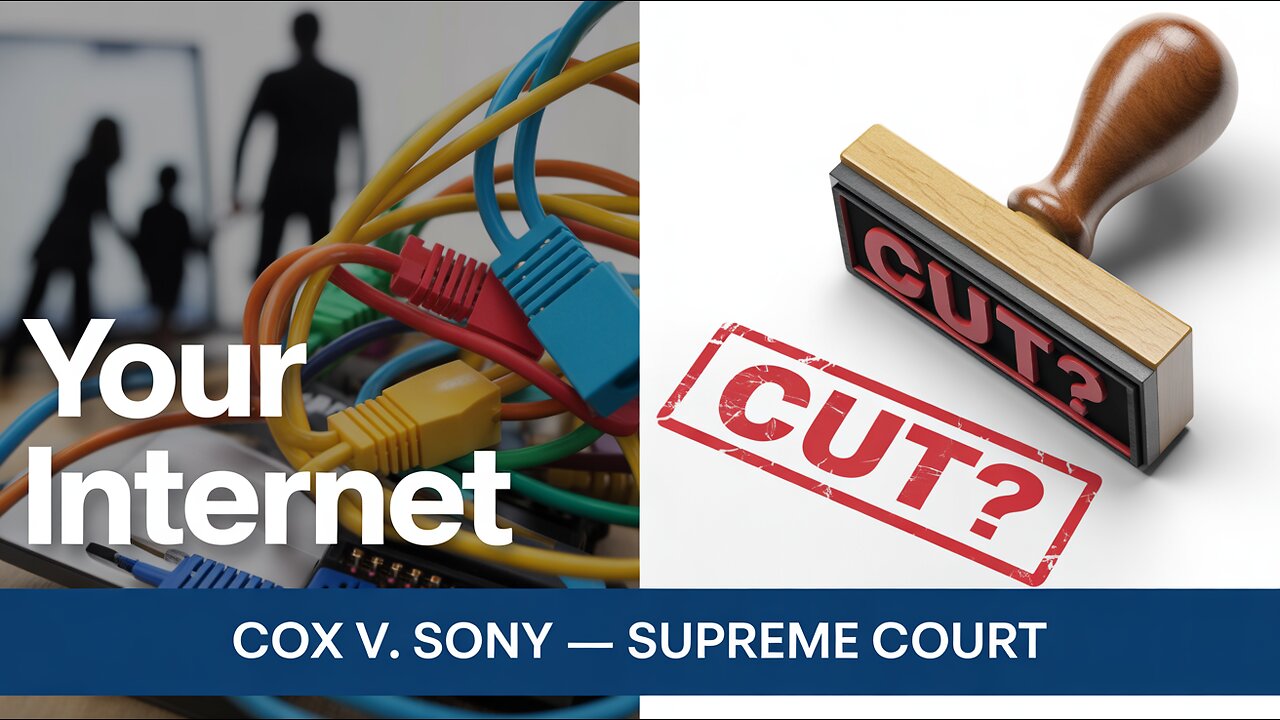Premium Only Content

Are ISPs the Copyright Police? SCOTUS Takes Cox v. Sony
Thank You For Smoking
https://amzn.to/46bMrog
The Supreme Court has agreed to hear Cox Communications v. Sony Music Entertainment, a landmark fight over whether internet providers (ISPs) can be held secondarily liable for what subscribers do online—and whether keeping an account active after infringement notices can count as “material contribution.”
Background in a nutshell: In 2019, a jury hit Cox with a $1B verdict. In February 2024, the Fourth Circuit reversed vicarious liability and vacated the damages for a new trial, but affirmed willful contributory infringement. On June 30, 2025, SCOTUS granted review. The case will be argued in the October 2025 Term and could reset expectations for ISPs, rights holders, campuses, and households.
What this case is (and isn’t):
• This isn’t Napster or Grokster (platforms that encouraged infringement). Cox is a neutral-conduit ISP.
• The central question is whether “notice + non-termination” can equal contributory liability without proof the ISP intended to foster infringement—and how “willful” should be construed for statutory damages.
Why the numbers matter:
• During the claim period, Cox reportedly used a 13-strike repeat-infringer policy but terminated only around 32 accounts for copyright violations, while over 600,000 accounts were terminated for non-payment.
• Labels argue Cox tolerated infringement to keep revenue; Cox argues mass termination on accusation risks cutting off innocent households and entire networks.
Where the law stands right now:
• Fourth Circuit: contributory infringement (willful) was upheld; vicarious liability was reversed (no direct financial benefit from the infringement itself); damages were vacated and sent back.
• SCOTUS will clarify the contributory standard (knowledge vs. intent) and what “willful” means for damages. The labels have also asked the Court to revisit vicarious liability’s “profit” requirement.
DMCA angle (Section 512 and “repeat infringers”):
• ISPs rely on DMCA safe harbors, but only if they reasonably implement a policy to terminate repeat infringers.
• Cox lost safe harbor years earlier in BMG v. Cox, which is why the current fight focuses on secondary liability and damages rather than safe harbor defenses.
What’s at stake for you:
• Households & shared Wi-Fi: Evidence often maps to an IP address, not a specific person. Aggressive termination policies could disconnect entire homes over accusations.
• Schools & libraries: Network operators with thousands of users face tough notice-and-action tradeoffs.
• Small ISPs: Compliance burdens and litigation risk could change how access is priced and policed.
How we frame it in this episode:
1) What Sony alleges vs. what Cox did (and didn’t) do
2) The Fourth Circuit’s split decision: contributory upheld, vicarious reversed, $1B vacated
3) The SCOTUS questions and why they matter beyond music copyrights
4) Practical stakes for families, campuses, libraries, and smaller providers
Fair use refresher (for context while we discuss clips and commentary):
• Fair use applies four factors: (1) purpose/character (including transformation), (2) nature, (3) amount/substantiality, and (4) market effect. Commerciality alone doesn’t decide the issue; it’s a holistic analysis.
Related history:
• Courts treated Napster and Grokster differently because of “inducement”—promotion of infringement can create liability even if the tech has lawful uses. That’s why Cox’s status as a conduit ISP is central, and why SCOTUS’s guidance could echo across the entire internet-access ecosystem.
Timeline & what to watch:
• SCOTUS granted review on June 30, 2025; merits briefing and argument will run in the October 2025 Term.
• Watch for how the Court handles “knowledge vs. intent” in contributory liability and whether it narrows or broadens “willfulness” for statutory damages. The ruling could influence parallel cases and reshape repeat-infringer policies.
-
 39:30
39:30
Scammer Payback
5 hours agoBefore you answer another scam call... Watch This
5992 -
 LIVE
LIVE
Edge of Wonder
5 hours ago‘Paranormal Forces Attacked My Daughter’: Laura Van Tyne Interview
148 watching -
 LIVE
LIVE
NAG Entertainment
1 hour agoSAVAGE Drummer! LIVE Requests! FOLLOW Idiot! HELP Grow This Category!
28 watching -
 LIVE
LIVE
GritsGG
9 hours ago24+ Hour Marathon Stream! Most Wins in WORLD! 3704+!
49 watching -
 LIVE
LIVE
TCDESIGNSLC
1 hour agoRumble Partner | Chief on Duty
16 watching -
 1:07:37
1:07:37
TheCrucible
4 hours agoThe Extravaganza! EP: 49 (10/07/25)
127K15 -
 1:23:41
1:23:41
Kim Iversen
3 hours agoTrump To Pardon Ghislaine Maxwell? | They Mocked It as a Horse Drug — Now It Could Cure Cancer
24.2K45 -
 29:08
29:08
Michael Franzese
2 hours agoEx-Mobster REVEALS the 15 Deadliest Killers in Organized Crime
14.4K6 -
 3:17:13
3:17:13
Biscotti-B23
4 hours ago🔴 LIVE PRACTICING FOR MY HERO ALL'S JUSTICE 💥 MHOJ2 ONLINE LOBBY & REACTING TO GAMEPLAY
709 -
 22:07
22:07
Jasmin Laine
5 hours agoRoom ERUPTS as Trump INTERRUPTS Carney—HUMILIATES Him in Front of Reporters
16.8K22
